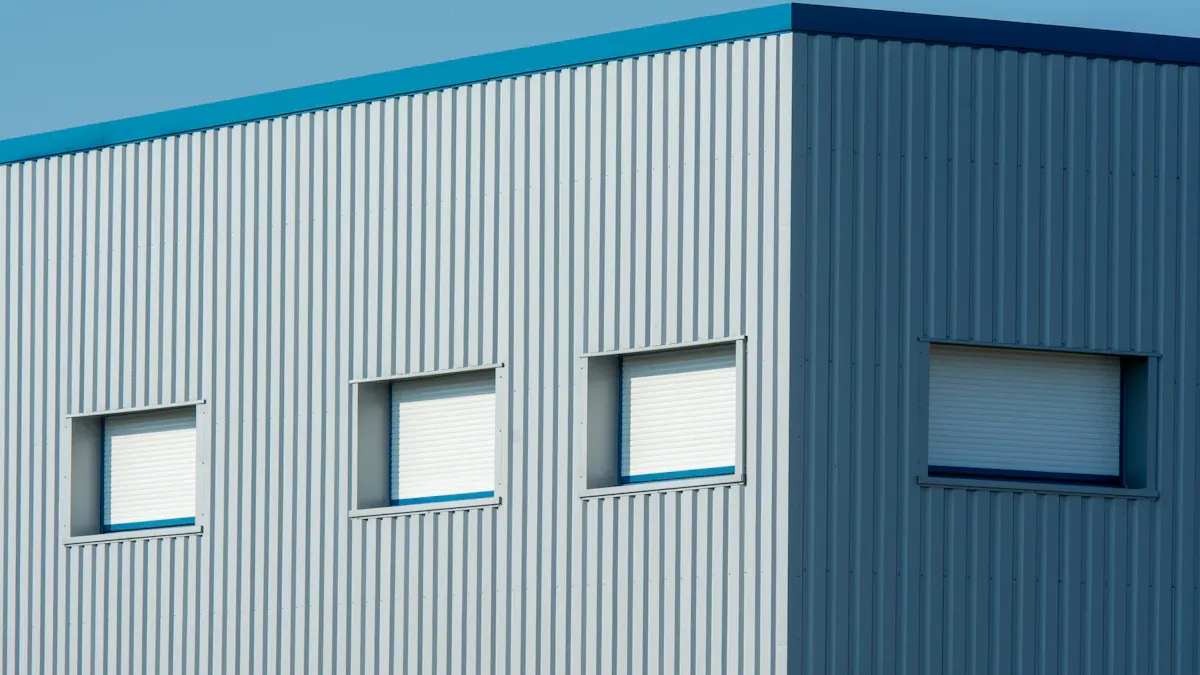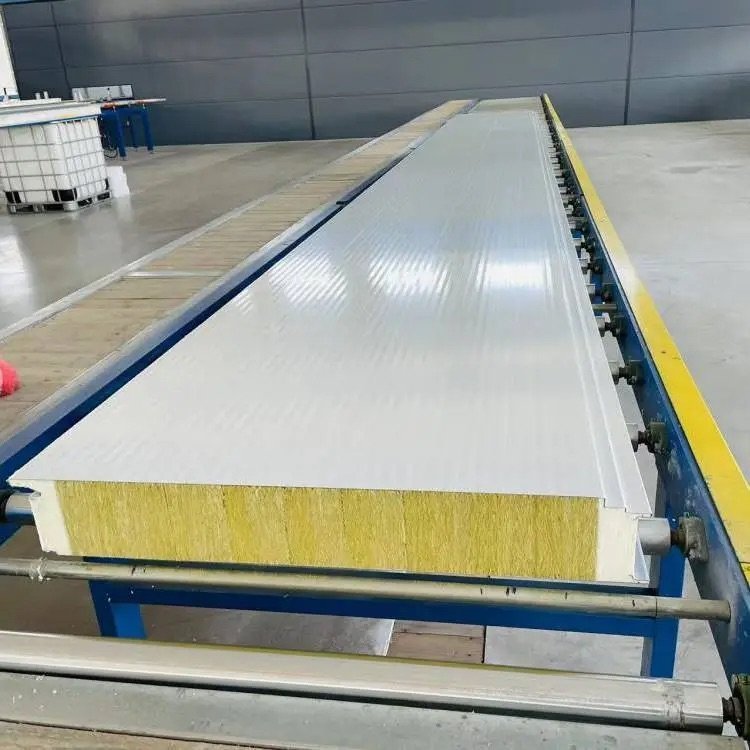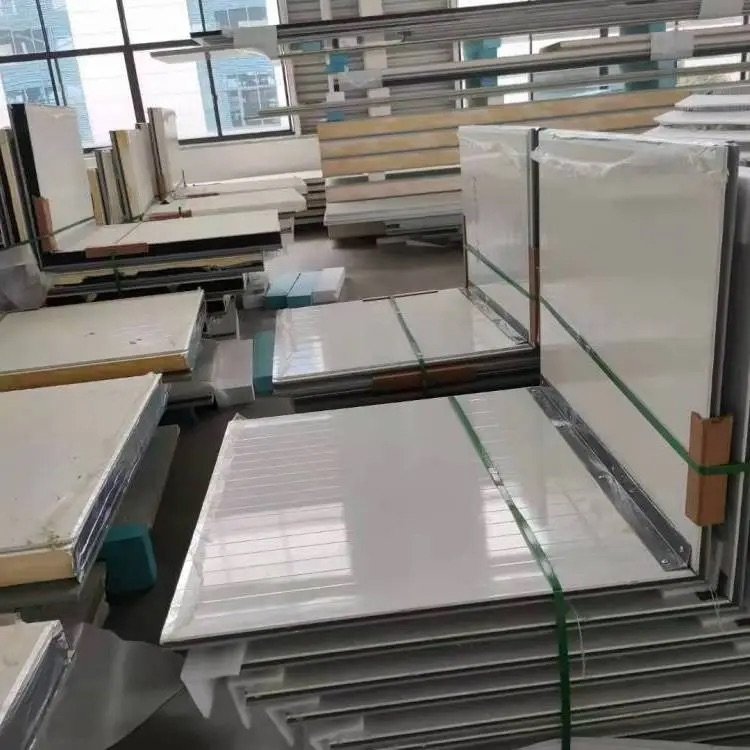You might ask why rockwool sandwich panels have excellent soundproofing properties. The secret lies in their thick and fibrous design. These panels effectively trap sound waves and significantly reduce noise. Rockwool also retains heat due to its low thermal conductivity (0.03 to 0.04 W/m·K), which saves energy and helps buildings maintain comfortable temperatures. With an A1 fire rating under the Euroclass system, it is very safe. More builders are incorporating it into eco-friendly construction, making rockwool panels ideal for modern buildings that require both soundproofing properties and insulation.
Rockwool sandwich panels are popular in Europe and North America, largely due to strict energy regulations and green building trends.
Key Takeaways
Rockwool sandwich panels block and soak up sound well. They are great for quiet places like homes and offices.
These panels resist fire and meet strict safety rules. This makes them safe to use in many buildings.
Rockwool panels save energy by keeping rooms warm or cool. This lowers heating and cooling bills a lot.
Using rockwool panels is good for the environment. They are made from natural stuff and cut down on harmful gases.
They last up to 100 years, so need fewer replacements. This makes rockwool panels a smart and eco-friendly choice.
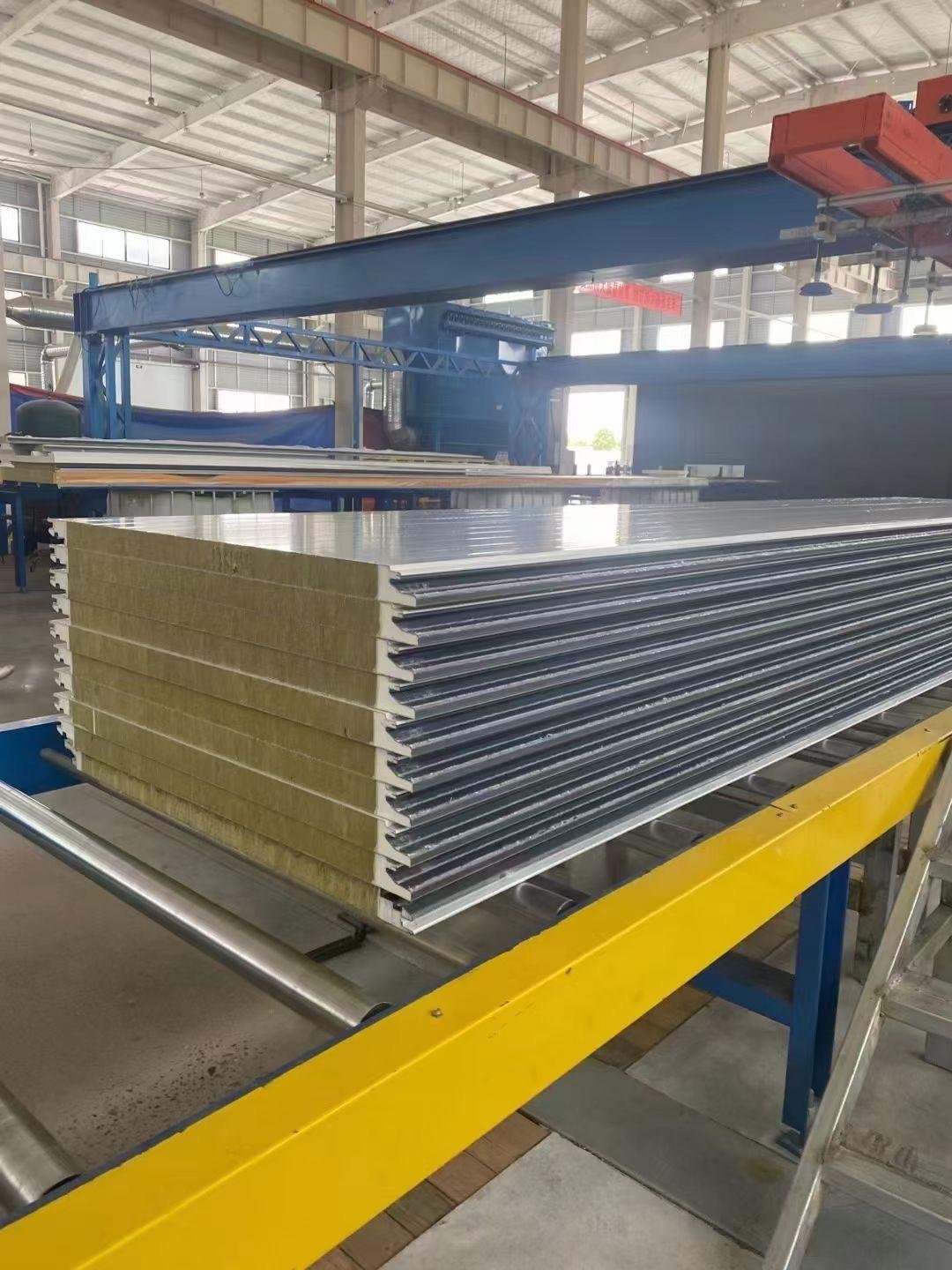
The Science Behind How Rockwool Sandwich Panels Reduce Noise
What They’re Made Of
Rockwool panels block noise because of their special design. They have a thick center made from melted rock spun into wool. The usual mix includes:
15% air spaces
5% rock fibers
This mix holds water well and lets air flow easily. The way the fibers are packed helps stop sound from passing through. The wool-like structure catches sound waves, cutting down noise. The thick center also stops sound from traveling through, making it great for quiet spaces.
How They Absorb and Block Sound
Rockwool panels both soak up and block sound. Their wool-like fibers act like tiny holes that weaken sound energy. When sound enters, it loses strength as it moves through the fibers. This makes the sound quieter and absorbs it well.
The thick center also stops sound from getting through. This means outside noise stays out of indoor areas. Tests show that fine rockwool fibers work great for soundproofing, proving how effective these panels are.
Why They’re Good at Soundproofing
Rockwool panels are made to stop sound and block noise. Their thick center helps them work well in many places. While exact numbers may change, they always provide strong soundproofing. This makes them a top choice for places needing less noise.
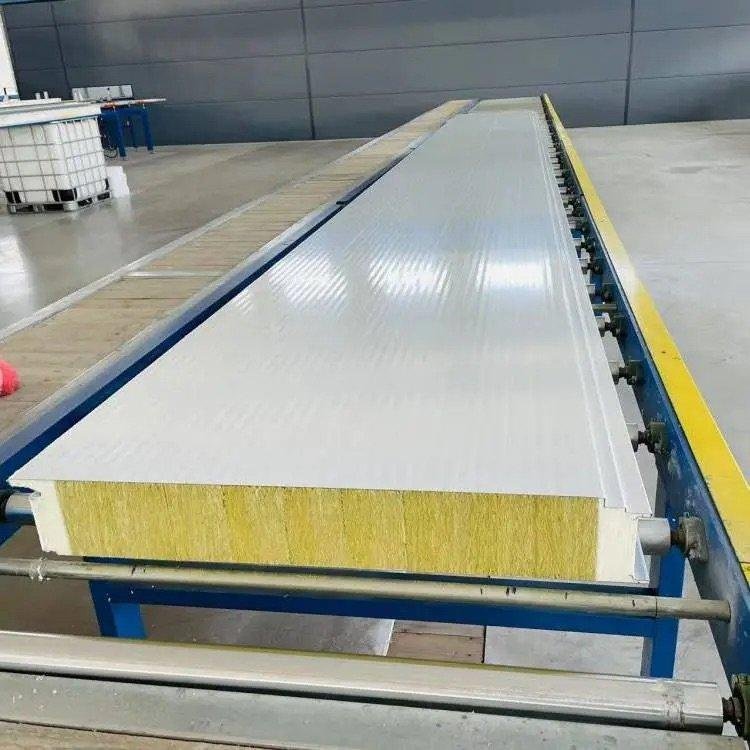
Advantages of Rockwool Sandwich Panels for Superior Soundproofing
Better Noise Blocking Abilities
Rockwool panels are great at blocking noise. They have a high Sound Transmission Class (STC) rating, between 45 and 52. This is higher than fiberglass insulation, which raises a wall’s STC from 33 to 39. Rockwool reduces noise better, making it perfect for quiet spaces.
The thick, wool-like structure of rockwool traps sound waves. When sound hits the panels, the fibers absorb and weaken it. This lowers noise levels a lot. These panels work well to block outside noise or stop sound between rooms.
Fire Safety and Resistance
Rockwool panels are very safe because they resist fire. They meet strict fire safety rules like ASTM E119-20 and CAN/ULC-S101-14. These tests check how well materials handle fire. Rockwool is also noncombustible under ASTM E136, making it safe for fire-risk areas.
Standard | What It Tests |
|---|---|
ASTM E119-20 | Fire Tests for Building Materials |
ASTM E136-22 | Checks if Materials Can Burn |
NFPA 285-23 | Fire Tests for Outside Wall Systems |
Products like ROCKWOOL Comfortbatt® and Comfortboard® 80 meet these rules. Builders can trust them for safety.
Keeps Heat In and Saves Energy
Rockwool panels don’t just block noise; they keep heat in too. With low thermal conductivity of 0.035 W/mK, they help control indoor temperatures. This means less energy is needed for heating or cooling, saving money.
These panels do two jobs—soundproofing and insulating. They are a smart choice for modern buildings. Rockwool makes spaces quieter and more energy-efficient.
Environmental Sustainability
Using rockwool sandwich panels helps protect the environment. These panels are made from basalt rock, a natural and renewable material. The production process uses recycled items, cutting waste and saving resources. This makes rockwool a green choice for building projects.
Rockwool panels also save energy. They keep heat from escaping or entering, making rooms comfy all year. By needing less heating or cooling, you use less energy and create fewer greenhouse gases. This makes rockwool great for energy-saving buildings.
Rockwool is also long-lasting. It keeps working well over time, so you replace it less often. This means less waste. Its fire resistance also makes it last longer. Fire-resistant materials need fewer repairs after accidents, adding to their eco-friendliness.
Rockwool panels also improve indoor air quality. They stop mold and mildew from growing, helping you breathe cleaner air. This supports green building ideas that care about people and the planet.
Choosing rockwool panels supports eco-friendly building. They save energy, resist fire, and are made sustainably. Whether for homes, offices, or factories, these panels help create spaces that are efficient and kind to the Earth.
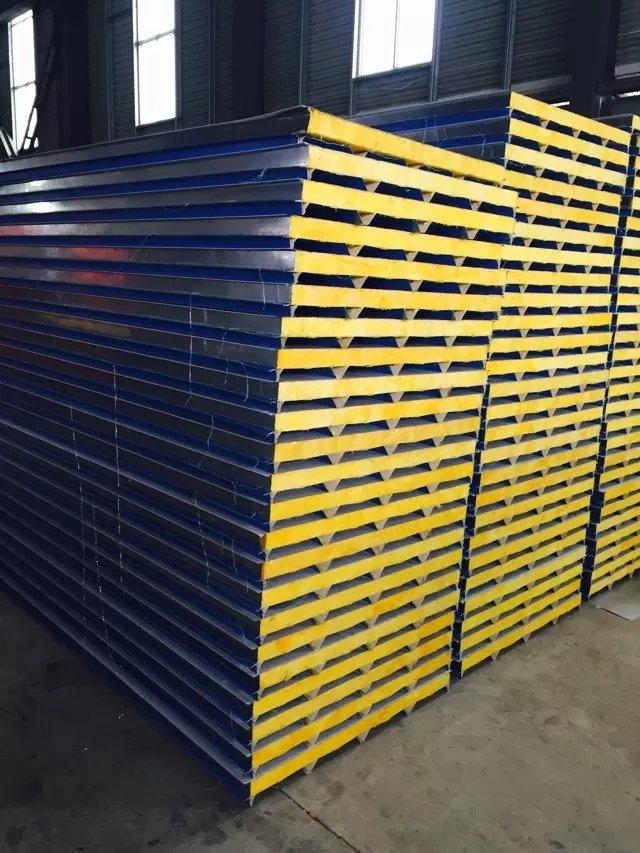
Uses of Rockwool Sandwich Panels for Soundproofing
Homes and Offices
Rockwool panels are great for homes and offices. They block noise between rooms, making spaces quieter and more private. In open offices, they absorb sound, reducing distractions. This helps workers focus and feel more comfortable.
Here are some real-life examples of rockwool panels in action:
Example | Details |
|---|---|
A new office in Milton, Ontario, using Rockwool materials. | |
Aercoustics Engineering | Sound experts used Rockfon to absorb noise in their open office. |
Solar Spectrum | Picked Rockfon ceilings for better sound and eco-friendly design. |
Government of Canada 90 Elgin St. | A $250 million building with Rockfon ceilings for sound and sustainability. |
These examples show how rockwool panels reduce noise and support green building goals.
Factories and Industrial Areas
In factories, noise control is very important for safety and work quality. Rockwool panels help by blocking loud sounds from machines. Their thick, wool-like design makes them great for noisy places.
Here are key ways rockwool panels perform:
Measure | What It Means |
|---|---|
Noise Reduction Coefficient (NRC) | Shows how much sound a material absorbs. An NRC of 0.75 means it absorbs 75% of sound. |
Sound Transmission Class (STC) | Rates how well something stops sound from passing through. Higher numbers mean better results. |
Insertion Loss (IL) | Measures how much sound is reduced when blocked by a material. |
Using rockwool panels makes factories safer and quieter. They also help meet noise rules and improve work efficiency.
Public Places and Schools
Places like schools, hospitals, and libraries benefit from rockwool panels. These panels block noise, making shared spaces more peaceful. In schools, they create quiet classrooms for better learning.
Rockwool panels are also used in special places like recording studios and home theaters. They absorb echoes and improve sound quality. Their fire-resistant feature makes them safe for public buildings.
Use | Benefits |
|---|---|
Homes and Schools | Blocks noise, improves privacy in homes, offices, and schools. |
Studios and Theaters | Absorbs echoes, improves sound for recording and listening. |
Workplaces | Lowers noise, boosts comfort and focus in offices and factories. |
HVAC Systems | Reduces noise from air systems, keeping spaces quieter. |
Choosing rockwool panels ensures quieter, safer, and more comfortable spaces in public and shared areas.
Specialized Acoustic Environments
For spaces needing perfect sound control, Rockwool sandwich panels are ideal. These panels work well in places where reducing noise and improving sound quality is crucial. Whether it’s a recording studio, home theater, or concert hall, Rockwool panels help create the best sound experience.
Why Rockwool Panels Are Great for Acoustic Spaces
Rockwool panels are made to absorb sound efficiently. Their thick, fibrous design traps sound waves, cutting down echoes. This makes them perfect for spaces needing clear sound. For instance, in recording studios, they reduce unwanted noise, helping capture clean audio.
Tip: Place Rockwool panels on walls, ceilings, or floors for better sound control.
Main Benefits for Acoustic Spaces
Echo Reduction: The fibers soak up sound, stopping it from bouncing around.
Better Sound Clarity: They lower background noise, improving music, speech, or recordings.
Flexible Design: These panels can be shaped to fit any space perfectly.
Real-Life Uses
Environment | How Rockwool Panels Help |
|---|---|
Recording Studios | Cuts noise, improves sound recording quality. |
Home Theaters | Reduces echoes, enhances audio experience. |
Concert Halls | Balances sound for live performances. |
Broadcasting Rooms | Ensures clear sound for radio and TV shows. |
Using Rockwool sandwich panels creates spaces with excellent sound. They improve acoustics, resist fire, and are eco-friendly, adding great value to any project.
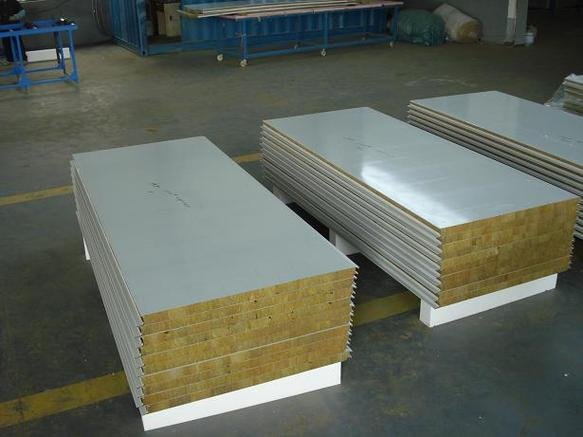
Why Rockwool Sandwich Panels Are the Best Choice for Soundproofing
Cost-Effectiveness and Long-Term Durability
Rockwool panels are a smart and affordable option. They can cut energy use by up to 30%, saving money on heating and cooling. This means quieter spaces and lower energy bills. Their lightweight design also makes them easy to install, reducing labor costs during construction.
These panels are built to last. They can stay effective for 75 to 100 years with proper care. This long lifespan means fewer replacements, saving money and reducing waste. Rockwool panels are both economical and eco-friendly.
Feature | Proof |
|---|---|
Energy Savings | Rockwool panels lower energy use by up to 30%, cutting costs over time. |
Eco-Friendly | They have less environmental impact than other materials, supporting green building. |
Easy Installation | Lightweight panels make installation faster and cheaper. |
Ease of Installation and Maintenance
Installing rockwool panels is quick and simple. Their design cuts installation time by over 40%, helping projects finish faster. This makes them great for homes and businesses, saving both time and money.
Taking care of these panels is easy too. With proper maintenance, they last for decades without losing their soundproofing or insulation abilities. They resist mold and mildew, staying effective in different environments with little upkeep.
Evidence Type | Details |
|---|---|
Fast Installation | Projects finish 40% faster with these panels. |
Long Lifespan | Panels last 75 to 100 years with proper care. |
Proven Success in Real-World Applications
Rockwool panels work well in many places. They are used in homes, offices, and factories to block noise and keep spaces quiet. Schools and hospitals also use them to create peaceful environments.
Besides soundproofing, these panels provide great insulation and fire safety. Builders and architects trust them for many projects. Whether it’s a busy office or a recording studio, rockwool panels deliver reliable results proven over time.
Rockwool sandwich panels are great for keeping spaces quiet. Their thick, wool-like design traps and blocks sound well. This makes rooms more peaceful and comfortable. These panels also resist fire, save energy, and are eco-friendly, adding extra benefits.
Tests show how well rockwool panels work:
Test Type | What It Found |
|---|---|
Sound Absorption | Checked in a special echo-free room |
Thermal Conductivity | Measured with advanced heat-testing tools |
Stronger panels with better soundproofing | |
Pressing Pressure (2.5 MPa) | Weaker panels with less soundproofing |
Rockwool panels are useful for homes, offices, and factories. They provide strong soundproofing and last a long time. Their eco-friendly design makes them a smart choice for modern buildings.
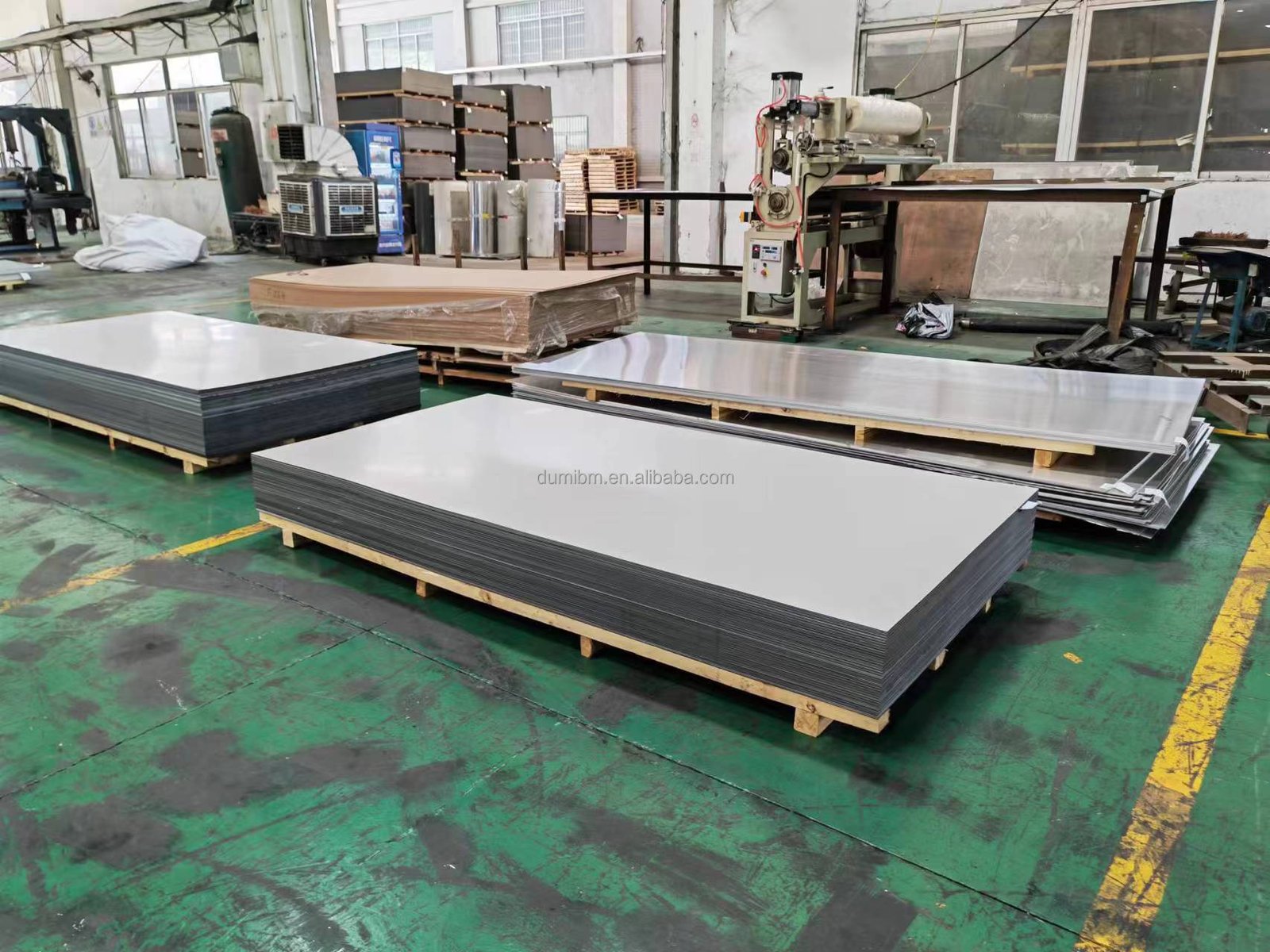
FAQ
1. Why are Rockwool sandwich panels good for soundproofing?
Rockwool panels lower noise because of their dense fibers. These fibers catch sound waves and stop them from passing through. The thick center also blocks sound, making spaces quieter.
2. Are Rockwool panels safe for homes?
Yes, they are very safe. Rockwool panels don’t burn and meet strict fire rules like ASTM E136. They also stop mold and mildew, keeping indoor air clean and healthy.
3. Do Rockwool panels help save energy?
Yes, they do! Rockwool panels keep heat inside because they don’t let it escape easily. This means less heating or cooling is needed, saving energy and lowering bills.
4. How long can Rockwool panels last?
They can last a very long time—up to 100 years. With good care, they keep working well for soundproofing, insulation, and fire safety.
5. Are Rockwool panels eco-friendly?
Yes, they are great for the environment. Made from natural rock and recycled items, Rockwool panels cut waste. They also save energy and reduce pollution, helping green building projects.
Tip: Pick Rockwool panels for quieter, greener, and energy-saving spaces.


